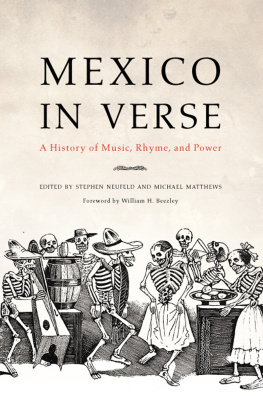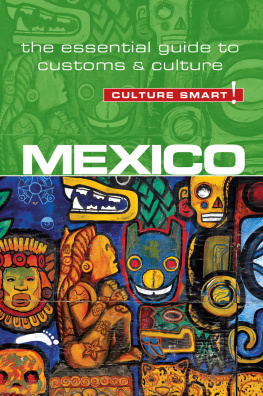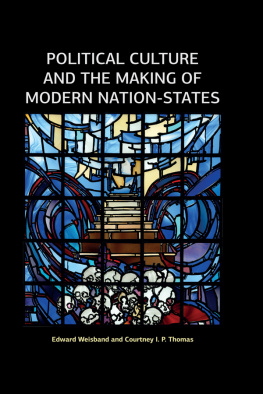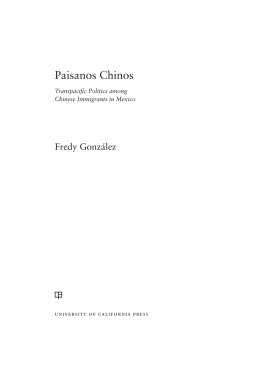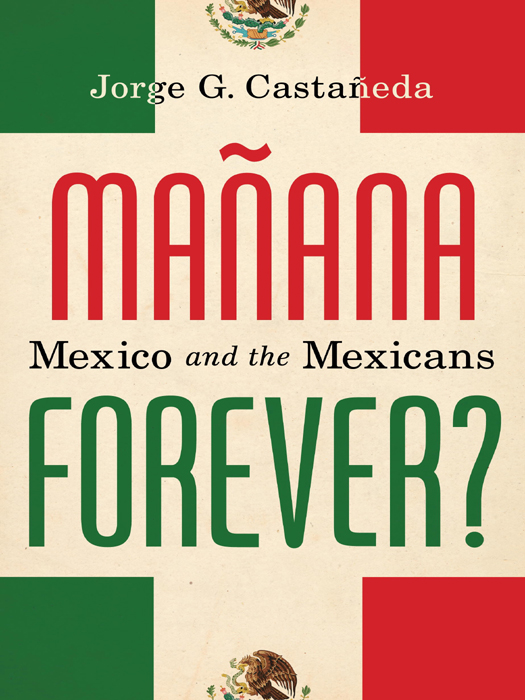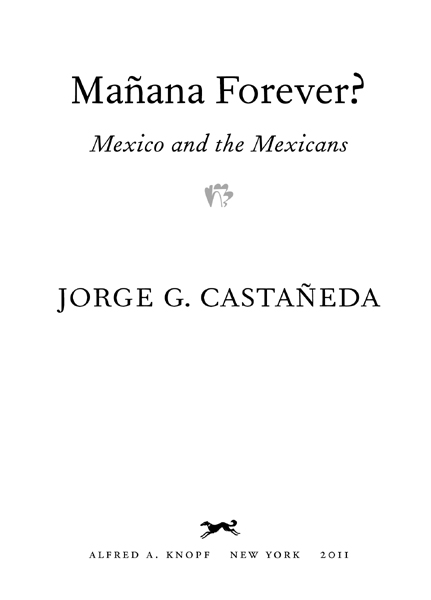ALSO BY JORGE G. CASTAEDA
Compaero
Utopia Unarmed
Limits to Friendship
(with Robert Pastor)
The Mexican Shock
Perpetuating Power
Ex-Mex: From Migrants to Immigrants
THIS IS A BORZOI BOOK
PUBLISHED BY ALFRED A. KNOPF
Copyright 2011 by Jorge G. Castaeda
All rights reserved. Published in the United States by Alfred A. Knopf,
a division of Random House, Inc., New York, and in Canada by
Random House of Canada Limited, Toronto.
www.aaknopf.com
Knopf, Borzoi Books, and the colophon are registered trademarks of Random House, Inc.
eISBN: 978-0-307-59660-4
LCCN: 2011925522
Jacket design by Jason Booher
v3.1
For Josefina Santacruz,
who accompanied me through much of this marvelous voyage
through the past and to the future
Contents
Acknowledgments
Many acknowledgments are in order. First, to Ash Green, my editor at Knopf, who convinced me to write this book and not another, and who kept me on as one of his writers after retiring from everyday editing. Then, to those who helped me enormously with research: Lourdes Zozaya, Dafne Tovar Miz, Andrea Ballesteros, Elisa Estrada, Mariana Celorio, and Jos Alberro, who did his best to get my statistics right, and most of all, Emma Vassallo, without whom this book would simply not exist. Then, to those who ploughed through the entire manuscript and on occasion tore it apart, but always improved it: Dudley Ankerson, Cassio Luiselli, Joel Ortega, Alan Riding, Manuel Rodrguez, and Federico San Romn. Then, to those who read parts or most of the text, and provided relevant, insightful, and productive advice, most of which I tried to follow: Claudio Lomnitz, Andrea Oate, Andrs Rozental, Guillermo Sheridan, and Marcela Tovar. And finally, two special thanks: to my sister Marina, for thinking up a great title, if I say so myself, and to Alejandra Zerecero, who proofread, researched, edited, and patiently put up with my many moods and manias.
Preface
Few countries have devoted so much time and energy as Mexico to dissecting and debating, to hailing or regretting their national character. Our obsession with who we are, and why, is endless and constant. It is not only ours. The number of foreign regards of Mexico is lengthy indeed: from Ambrose Bierce to Walter Lippmann, Cartier-Bresson to Jacques Soustelle, from D. H. Lawrence to Graham Greene, from Oscar Lewis to Tina Modotti, Edward Weston, B. Traven, and Leon Trotsky, from Sergei Eisenstein, Luis Buuel, and Elia Kazan to John Reed and Jean Le Clzio. Mexican poets, novelists, anthropologists, sociologists and journalists, politicians, and painters have all delved into the Mexican soul, hoping to discover the Rosetta Stone that will finally decrypt and reveal the unpolished jewel of Mexican identity that so attracts admirers, discourages skeptics, and systematically fascinates and thwarts academics.
This is not a book about the Mexican national character, but about some of the countrys most distinguishing origins or features, and their consequences. It is about their contradiction with the daily reality of a society ever more removed from an initial series of national traits that rendered it so endearing and frustrating to Mexicans, no less than to foreign visitors, travelers, retirees, or adventurers. It is essentially an attempt to explain Mexico to Mexicans, and to Americans. It seeks to explain why the very national character that helped forge Mexico as a nation now dramatically hinders its search for a future and modernity. While clearly in a country as regionally, ethnically, and socially diverse as Mexico such generalizations are perilous, shared cultural, historical, and geographical experiences do nonetheless create shared characteristics. A discussion of national character as a whole has obvious limitations and is inevitably superficial, leading to a turgid academic debate
The traits we will address are not exactly those stereotypes understandably offensive to Mexicans: lazy, irresponsible, violent, or despondent. Nor are they mannerisms often linked to Mexicans though hardly restricted to them: machismo, a different sense of time, or a special feeling of uniqueness embodied in what Jos Vasconcelos called our cosmic race. Furthermore, this contradiction between the cultural traits and the reality of the country is by no means its only obstacle to full-fledged modernity. But it is, in our view, the most crucial. Others have written about the lack of a democratic tradition, corruption, the enormous concentration of wealth and power in the hands of very few, the negative impact of living beside a neighbor such as ours or, conversely, the poorly exploited benefits of contiguity with the United States. The purpose of this exercise, as the Coen brothers Big Lebowski might have said, is to determine what ties the room together. It is the disconnect between Mexicos national character and its current reality.
The book is organized by contrasts. One chapter seeks to describe, substantiate, and probe a particular trait of the national character; the following chapter attempts to confront that trait with the description of a central feature of modern Mexico that contradicts and invalidates the previously depicted trait. It hopes to show how that specific trait is no longer viable in todays Mexico, and has become a major obstacle to its progress. Each trait is derived from three fonts of wisdom: the classics, the numbers, and the authors own experience. What makes the three sources appropriate and useful is, precisely, their diversity.
First, the classics. Rarely has a country devoted so much intelligence, hard work, speculation, and soul-searching introspection to identifying its identity. As far back as a century ago, and as recently as two decades past, the examination of the Mexican soul has consumed poets like Octavio Paz, novelists like Carlos Fuentes, essayists like Jorge Cuesta, Alfonso Reyes, Samuel Ramos, and Salvador Novo, dramatists like Rodolfo Usigli, psychoanalysts like Santiago Ramrez and Jorge Portilla, anthropologists from Manuel Gamio and Miguel Len-Portilla to Roger Bartra, Mauricio Tenorio, and Claudio Lomnitz, sociologists from Guillermo Bonfil to historians like Edmundo OGorman. They have nearly always disagreed on details, devoting interminable pages to highly specializedon occasion arcanepolemics, yet at the same time their research and reflection have had the same fundamental object. They cannot be lumped together into one single corpus of theory or description, but viewed from outside the specialists realm, they share enough conclusions so as to suggest something of a consensus. We shall select and study a few of those consensual traitsacknowledging that there are many others, far less unanimousby taking the experts common viewpoints at face value. In many aspects, though not in all, they got it right.
A second set of sources are the mountains of data that the classics partly lacked to buttress their ruminations, insights, and intuitions, but which would have confirmed them, had they been available. This is not so say that they based their views only on hearsay and impressionistic analysesthere was that, but also intuition, travel, study, experience. Still, Mexican society was, until the mid-1980s, a very opaque one from just about every point of view. Over the past twenty years or so, however, it has been dissected by innumerable polls, surveys, focus groups, microstudies, sponsored and carried out by public and private agencies, universities and marketing firms, political consultants and parties, international agencies and local scholars. The National Statistics Institute, founded in 1985, has only recently compiled comparable historical surveys, while national household income and spending studies are less than thirty years old. After years of living without polls other than for certain very specific marketing purposeswhy bother with election polls when there are no real electionsMexico has become a pollsters paradise, partly thanks to the advent of modernity and democracy, partly perhaps as a result of a certain narcissism. There is no relation between the data available to the classicseven the most recent among themand that which any student or candidate for office can retrieve today from almost infinite sources. This information is not always easily or accurately comparable in time and space; series are not uniform; regional perspectives are often unavailable; and, inevitably, there is a great deal of self-serving information culled from leading questions or foregone conclusions. Similarly, there are valid doubts and objections regarding the reliability of Mexican polling firms, especially in view of their relative youth and inexperience. This explains why we often quote or refer to several polls simultaneously, and why the data we cite should always be seen as indicative of trends, not as precise measurements. Nonetheless, this trove of facts provides the speculation of the classics with the type of solid statistical foundation that they were partly deprived of before, and which either would have made their ingenious intuitions impossible if wrong, or more reliable if right.



